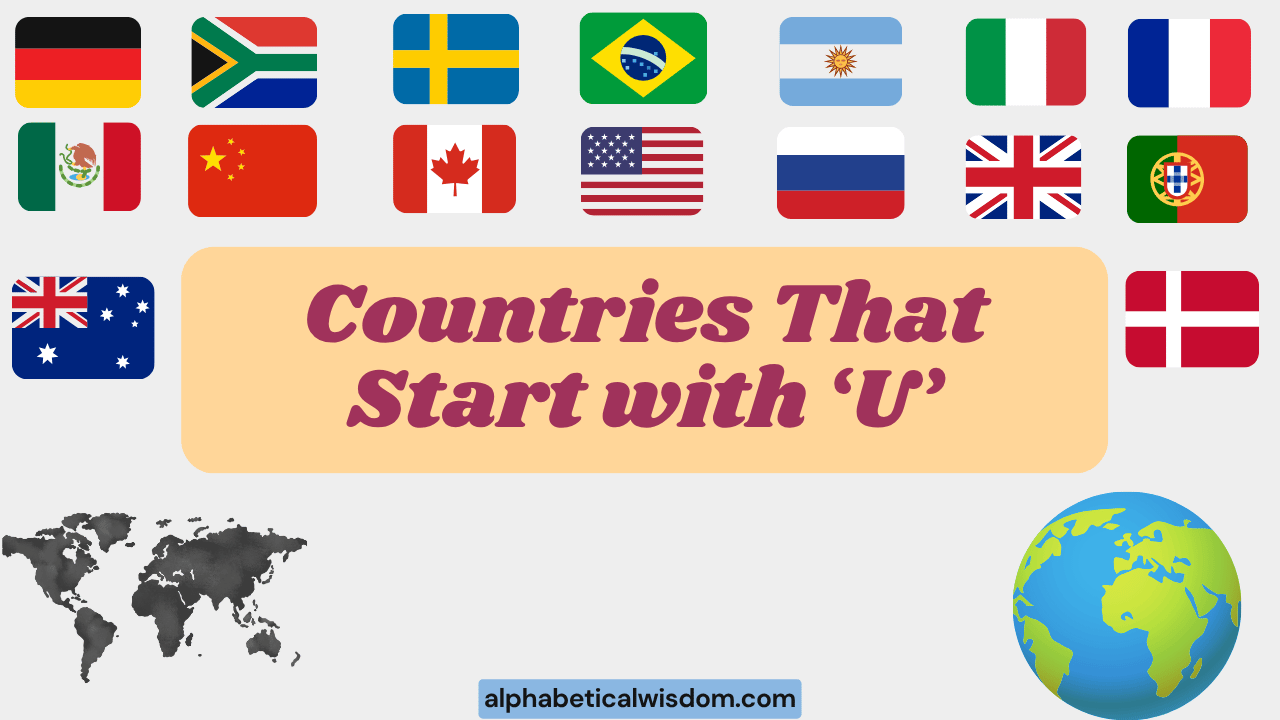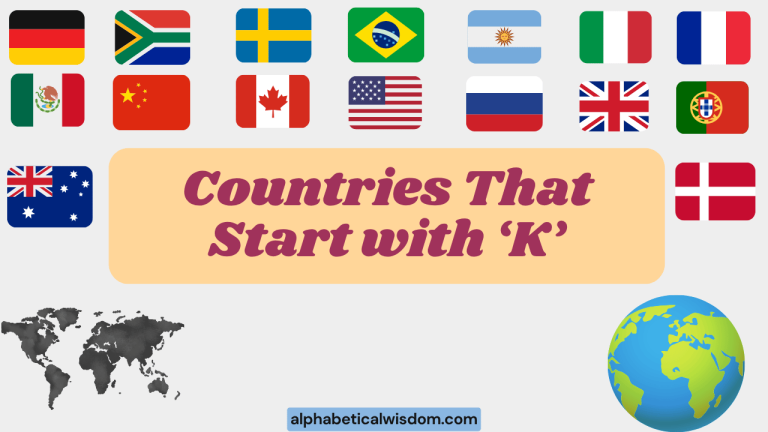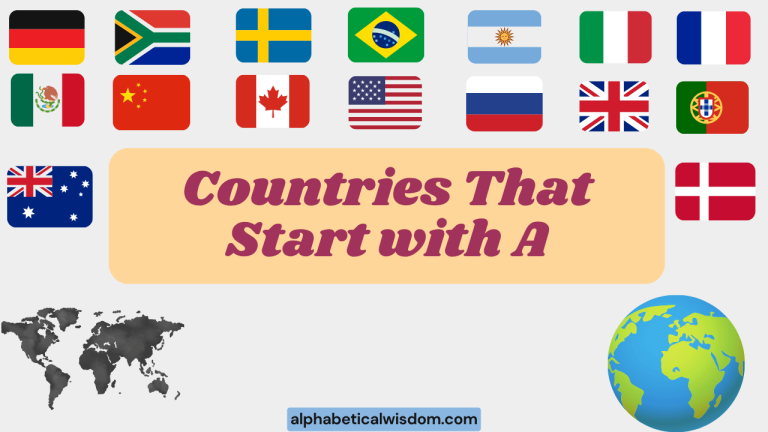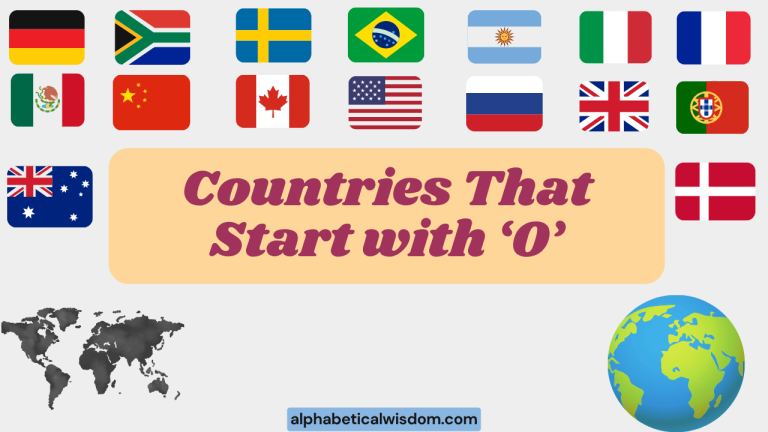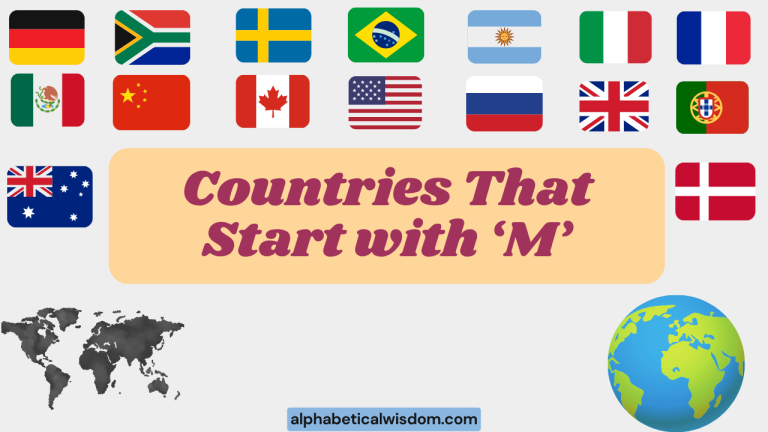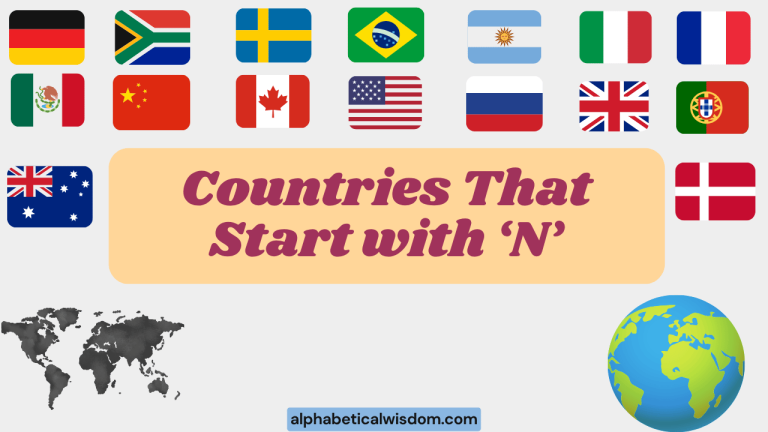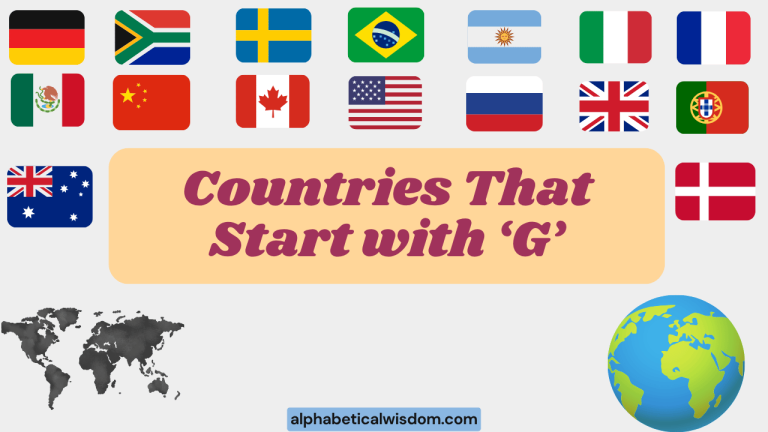Countries Starting With U: Grammar and Usage Guide
Understanding how to use country names correctly is crucial for clear and accurate communication in English. This article focuses specifically on countries whose names begin with the letter “U,” exploring their grammatical properties, common usages, and potential pitfalls.
Mastering the correct usage of these names enhances both written and spoken English, making your communication more precise and professional. This guide is beneficial for English language learners, educators, and anyone seeking to improve their grammatical accuracy when discussing global geography and international relations.
Table of Contents
- Introduction
- Definition: Countries Starting With U
- Structural Breakdown
- Types and Categories
- Examples of Countries Starting With U
- Usage Rules
- Common Mistakes
- Practice Exercises
- Advanced Topics
- FAQ Section
- Conclusion
Definition: Countries Starting With U
A country is a self-governing political entity, often associated with a specific territory and population. When discussing countries in English grammar, we treat their names as proper nouns.
Proper nouns always begin with a capital letter. In this article, we are focusing on the grammatical aspects of using country names that specifically begin with the letter “U.” This includes understanding their singular and plural forms (if applicable), their use with articles, and their role within sentences.
Country names function as nouns, and like other nouns, they can serve as subjects, objects, or complements within a sentence. They can also be modified by adjectives and used in prepositional phrases.
Understanding these functions is essential for constructing grammatically correct sentences. The key is to recognize that they are proper nouns, which dictates certain rules about capitalization and article usage.
Structural Breakdown
The structural breakdown of using country names starting with “U” involves several key elements. These elements are capitalization, articles (the/a/an), possessive forms, and their role in sentence construction.
Understanding how these elements interact is crucial for grammatical accuracy.
Capitalization
As proper nouns, country names always begin with a capital letter. This is a fundamental rule of English grammar and applies universally to all country names, including those starting with “U.” For example, “Uganda,” “Ukraine,” and “United States” must always be capitalized.
Articles
The use of articles with country names can be tricky. Generally, most country names do not require the definite article “the.” However, there are exceptions, particularly when the country name includes words like “States,” “Kingdom,” or “Republic,” or when referring to a collective or union of states.
For example, “the United States,” “the United Kingdom,” and “the United Arab Emirates” all require “the.” Singular country names like “Uganda” and “Ukraine” do not typically use “the.”
Possessive Forms
To show possession with a country name, we use an apostrophe and the letter “s” (‘s). For example, “Uganda’s economy” or “Ukraine’s history.” If the country name is plural (e.g., the United States), the possessive form is “the United States’ economy.”
Sentence Construction
Country names can function as subjects, objects, or complements in a sentence. For example:
- Subject: Uganda is a beautiful country.
- Object: I visited Ukraine last year.
- Complement: He is from the United States.
Types and Categories
Countries starting with the letter “U” can be categorized based on their geographical location, political structure, and common grammatical patterns. This section breaks down these categories to provide a clearer understanding of their usage.
Geographical Location
Countries can be grouped based on their continent or region. This helps in understanding the context in which the country name is used.
For example, Uganda is located in East Africa, while Ukraine is in Eastern Europe. The United States is located in North America.
Political Structure
The political structure of a country can influence how its name is used grammatically. For example, “the United States” implies a union of states, hence the use of the definite article “the.” Similarly, “the United Kingdom” refers to a kingdom comprised of multiple countries.
Grammatical Patterns
Some countries follow specific grammatical patterns. For instance, countries with plural names, such as “the United States,” always take a plural verb when the focus is on the individual states.
However, when the focus is on the country as a single entity, a singular verb is often used, especially in informal contexts.
Examples of Countries Starting With U
This section provides extensive examples of how to use countries starting with “U” in various grammatical contexts. These examples are categorized to illustrate different usage patterns and grammatical rules.
Examples with Articles
This table illustrates when to use the definite article “the” with country names starting with “U.”
| Country Name | Example Sentence | Explanation |
|---|---|---|
| Uganda | Uganda is known for its diverse wildlife. | No article needed for singular country names. |
| Ukraine | Ukraine has a rich cultural history. | No article needed for singular country names. |
| The United States | The United States is a major global power. | “The” is required because it’s a union of states. |
| The United Kingdom | The United Kingdom consists of Great Britain and Northern Ireland. | “The” is required because it’s a kingdom of multiple countries. |
| The United Arab Emirates | The United Arab Emirates is known for its modern architecture. | “The” is required because it’s a union of emirates. |
| Uganda | I plan to visit Uganda next year. | No article needed before singular country names. |
| Ukraine | The conflict in Ukraine has affected global markets. | No article needed before singular country names. |
| The United States | The President of the United States addressed the nation. | “The” is required because it’s a union of states. |
| The United Kingdom | The Prime Minister of the United Kingdom announced new policies. | “The” is required because it’s a kingdom of multiple countries. |
| The United Arab Emirates | The economy of the United Arab Emirates is heavily reliant on oil. | “The” is required because it’s a union of emirates. |
| Uganda | Coffee from Uganda is highly regarded. | No article needed before singular country names. |
| Ukraine | The language spoken in Ukraine is Ukrainian. | No article needed before singular country names. |
| The United States | The education system in the United States varies by state. | “The” is required because it’s a union of states. |
| The United Kingdom | The royal family in the United Kingdom is a popular topic of discussion. | “The” is required because it’s a kingdom of multiple countries. |
| The United Arab Emirates | Tourism in the United Arab Emirates is a growing industry. | “The” is required because it’s a union of emirates. |
| Uganda | The capital of Uganda is Kampala. | No article needed before singular country names. |
| Ukraine | The flag of Ukraine is blue and yellow. | No article needed before singular country names. |
| The United States | The legal system in the United States is based on common law. | “The” is required because it’s a union of states. |
| The United Kingdom | The healthcare system in the United Kingdom is publicly funded. | “The” is required because it’s a kingdom of multiple countries. |
| The United Arab Emirates | The culture of the United Arab Emirates is influenced by Islamic traditions. | “The” is required because it’s a union of emirates. |
Examples as Subjects, Objects, and Complements
This table demonstrates how countries starting with “U” function as subjects, objects, and complements within sentences.
| Function | Country Name | Example Sentence |
|---|---|---|
| Subject | Uganda | Uganda is a landlocked country in East Africa. |
| Subject | Ukraine | Ukraine borders several European countries. |
| Subject | The United States | The United States has a diverse population. |
| Object | Uganda | I have always wanted to visit Uganda. |
| Object | Ukraine | She studied the history of Ukraine in college. |
| Object | The United States | He immigrated to the United States ten years ago. |
| Complement | Uganda | My friend is from Uganda. |
| Complement | Ukraine | She identifies as Ukrainian, meaning she is from Ukraine. |
| Complement | The United States | He is an American citizen, meaning he is from the United States. |
| Subject | Uganda | Uganda‘s economy is largely based on agriculture. |
| Subject | Ukraine | Ukraine‘s strategic location has made it a key player in regional politics. |
| Subject | The United States | The United States‘ influence on global culture is undeniable. |
| Object | Uganda | The documentary showcased the natural beauty of Uganda. |
| Object | Ukraine | The world watched the events unfolding in Ukraine with concern. |
| Object | The United States | Many people dream of living in the United States. |
| Complement | Uganda | The best coffee I’ve ever tasted was from Uganda. |
| Complement | Ukraine | Her ancestry can be traced back to Ukraine. |
| Complement | The United States | His accent clearly indicates that he is from the United States. |
| Subject | The United Kingdom | The United Kingdom has a rich history of literature. |
| Object | The United Kingdom | She plans to study abroad in the United Kingdom next semester. |
| Complement | The United Kingdom | Their traditions are deeply rooted in the United Kingdom. |
| Subject | The United Arab Emirates | The United Arab Emirates is famous for its modern skyscrapers. |
| Object | The United Arab Emirates | He traveled to the United Arab Emirates for a business conference. |
| Complement | The United Arab Emirates | Their culture is heavily influenced by the United Arab Emirates. |
Examples with Possessive Forms
This table illustrates the use of possessive forms with countries starting with “U.”
| Country Name | Example Sentence | Explanation |
|---|---|---|
| Uganda | Uganda’s economy is heavily reliant on agriculture. | Singular country name, so use ‘s. |
| Ukraine | Ukraine’s history is filled with periods of conflict and resilience. | Singular country name, so use ‘s. |
| The United States | The United States’ foreign policy has a global impact. | Plural country name, so use ‘s after the plural form. |
| The United Kingdom | The United Kingdom’s monarchy is one of the oldest in the world. | Plural country name, so use ‘s after the plural form. |
| The United Arab Emirates | The United Arab Emirates’ oil reserves are substantial. | Plural country name, so use ‘s after the plural form. |
| Uganda | Uganda’s wildlife is a major tourist attraction. | Singular country name, so use ‘s. |
| Ukraine | Ukraine’s agricultural sector is vital to its economy. | Singular country name, so use ‘s. |
| The United States | The United States’ healthcare system is a topic of ongoing debate. | Plural country name, so use ‘s after the plural form. |
| The United Kingdom | The United Kingdom’s education system is highly regarded. | Plural country name, so use ‘s after the plural form. |
| The United Arab Emirates | The United Arab Emirates’ infrastructure is among the most advanced. | Plural country name, so use ‘s after the plural form. |
| Uganda | Uganda’s culture is rich and diverse. | Singular country name, so use ‘s. |
| Ukraine | Ukraine’s traditions are deeply rooted in history. | Singular country name, so use ‘s. |
| The United States | The United States’ legal system is based on common law. | Plural country name, so use ‘s after the plural form. |
| The United Kingdom | The United Kingdom’s political landscape is constantly evolving. | Plural country name, so use ‘s after the plural form. |
| The United Arab Emirates | The United Arab Emirates’ economic policies are aimed at diversification. | Plural country name, so use ‘s after the plural form. |
| Uganda | Uganda’s natural resources are abundant. | Singular country name, so use ‘s. |
| Ukraine | Ukraine’s geographic location is strategically important. | Singular country name, so use ‘s. |
| The United States | The United States’ military strength is a major factor in global security. | Plural country name, so use ‘s after the plural form. |
| The United Kingdom | The United Kingdom’s cultural exports are influential worldwide. | Plural country name, so use ‘s after the plural form. |
| The United Arab Emirates | The United Arab Emirates’ commitment to sustainability is growing. | Plural country name, so use ‘s after the plural form. |
Usage Rules
The usage rules for countries starting with “U” are generally consistent with the rules for all country names. However, there are specific nuances to keep in mind, especially regarding articles and verb agreement.
Capitalization Rule
Always capitalize the first letter of each word in the country’s name. This rule is non-negotiable and applies to all proper nouns.
Article Usage
As mentioned earlier, most singular country names do not require the definite article “the.” However, countries with plural names or those including words like “States,” “Kingdom,” or “Republic” usually do. It’s essential to memorize these exceptions.
Verb Agreement
For countries with plural names (e.g., the United States), verb agreement can be tricky. In formal writing, it’s generally accepted to use a singular verb when referring to the country as a single entity.
However, in informal contexts, a plural verb is sometimes used, especially when emphasizing the individual states.
For example:
- Formal: The United States is a major economic power.
- Informal: The United States are discussing new trade agreements.
Adjective Forms
Many countries have corresponding adjective forms that are used to describe things related to that country. For example:
- Uganda → Ugandan
- Ukraine → Ukrainian
- The United States → American
Common Mistakes
Several common mistakes occur when using countries starting with “U.” Being aware of these mistakes can help you avoid them in your writing and speech.
Incorrect Capitalization
Incorrect: uganda is a beautiful country.
Correct: Uganda is a beautiful country.
Incorrect Article Usage
Incorrect: I visited the Uganda last year.
Correct: I visited Uganda last year.
Incorrect: She is from United States.
Correct: She is from the United States.
Incorrect Possessive Form
Incorrect: Uganda’s’ economy is growing.
Correct: Uganda’s economy is growing.
Incorrect: The United States’s foreign policy is complex.
Correct: The United States’ foreign policy is complex.
Incorrect Verb Agreement
Incorrect: The United States are a powerful nation (in formal writing).
Correct: The United States is a powerful nation.
Practice Exercises
Test your knowledge with these practice exercises. Fill in the blanks with the correct form of the country name, including articles where necessary.
Exercise 1: Fill in the Blanks (Article Usage)
| Question | Answer |
|---|---|
| 1. I want to travel to _______ next year. (Uganda) | Uganda |
| 2. _______ is known for its rich culture. (Ukraine) | Ukraine |
| 3. _______ has a significant influence on global politics. (United States) | The United States |
| 4. The Queen resides in _______. (United Kingdom) | The United Kingdom |
| 5. Dubai is a city in _______. (United Arab Emirates) | The United Arab Emirates |
| 6. Coffee from _______ is highly sought after. (Uganda) | Uganda |
| 7. _______ is facing significant challenges due to the ongoing conflict. (Ukraine) | Ukraine |
| 8. The Statue of Liberty is a famous landmark in _______. (United States) | The United States |
| 9. London is the capital of _______. (United Kingdom) | The United Kingdom |
| 10. _______ is known for its luxurious hotels and shopping malls. (United Arab Emirates) | The United Arab Emirates |
Exercise 2: Correct the Errors
Identify and correct the errors in the following sentences.
| Question | Answer |
|---|---|
| 1. uganda’s economy is growing rapidly. | Uganda’s economy is growing rapidly. |
| 2. Ukraine’s history are complex. | Ukraine’s history is complex. |
| 3. The united states are a diverse country. | The United States is a diverse country. |
| 4. I am planning a trip to the ukraine. | I am planning a trip to Ukraine. |
| 5. The United Arab Emirates’s economy is booming. | The United Arab Emirates’ economy is booming. |
| 6. Uganda is locate in East Africa. | Uganda is located in East Africa. |
| 7. The United Kingdom’s government are introducing new policies. | The United Kingdom’s government is introducing new policies. |
| 8. The capital of united states is Washington, D.C. | The capital of the United States is Washington, D.C. |
| 9. I want to learn more about the culture of the united arab emirates. | I want to learn more about the culture of the United Arab Emirates. |
| 10. Ukraine’s geography are very diverse. | Ukraine’s geography is very diverse. |
Exercise 3: Sentence Construction
Create sentences using the following prompts, ensuring correct grammar and article usage.
| Prompt | Example Answer |
|---|---|
| 1. Uganda (tourism) | Tourism in Uganda is growing due to its natural beauty. |
| 2. Ukraine (culture) | Ukraine’s culture is rich and diverse, influenced by its history. |
| 3. The United States (economy) | The United States’ economy is one of the largest in the world. |
| 4. The United Kingdom (politics) | The United Kingdom’s political system is a parliamentary democracy. |
| 5. The United Arab Emirates (architecture) | The architecture in the United Arab Emirates is modern and innovative. |
| 6. Uganda (wildlife) | Uganda’s wildlife attracts many tourists each year. |
| 7. Ukraine (agriculture) | Ukraine’s agriculture is a significant part of its economy. |
| 8. The United States (education) | The United States’ education system varies greatly by state. |
| 9. The United Kingdom (history) | The United Kingdom’s history is filled with significant events. |
| 10. The United Arab Emirates (innovation) | The United Arab Emirates’ innovation in technology is rapidly advancing. |
Advanced Topics
For advanced learners, understanding more complex aspects of using country names is crucial. This includes nuanced verb agreement, historical contexts, and idiomatic expressions.
Nuanced Verb Agreement
While the general rule is to use a singular verb with countries like “the United States” in formal writing, there are instances where a plural verb is more appropriate. This often depends on the context and the intended emphasis.
For example:
- The United States is a member of the United Nations. (Focus on the country as a single entity)
- The United States are divided on the issue of climate change. (Focus on the individual states)
Historical Contexts
The names and boundaries of countries can change over time due to political events, wars, and treaties. Understanding the historical context is essential for accurate communication.
For instance, referring to “Ukraine” in different historical periods might require different grammatical constructions or additional context to avoid ambiguity.
Idiomatic Expressions
Certain idiomatic expressions use country names in unique ways. These expressions often have cultural or historical significance and require specific knowledge to use correctly.
While there aren’t many common idioms specifically using countries starting with “U,” understanding the general principle of idiomatic usage is important.
FAQ Section
Here are some frequently asked questions about using countries starting with “U” in English grammar.
- Why do some country names require “the” while others don’t?
The use of “the” before a country name depends on the structure and historical context of the name. Countries that are unions, kingdoms, or republics often require “the” because they refer to a collective entity rather than a single, unified territory. Singular country names typically do not require “the.”
- Is it always incorrect to use a plural verb with “the United States”?
Not always. In formal writing, a singular verb is generally preferred when referring to the country as a single entity. However, in informal contexts, a plural verb is sometimes used, especially when emphasizing the individual states or their actions.
- How do I form the possessive of a country name that ends in “s”?
For singular country names that end in “s,” add an apostrophe and an “s” (‘s). For plural country names, simply add an apostrophe after the “s.” For example, “the United States’ economy.”
- What if a country changes its name? How does that affect grammar?
When a country changes its name, it’s important to use the correct name for the relevant historical period. Using the old name in a contemporary context would be grammatically incorrect and potentially confusing. Always research the current and historical names to ensure accuracy.
- Are there any exceptions to the capitalization rule for country names?
No, there are no exceptions to the capitalization rule for country names. All proper nouns, including country names, must always begin with a capital letter.
- How do I know which adjective form to use for a country name?
Most countries have established adjective forms that are commonly used. These forms can often be found in dictionaries or online resources. For example, the adjective form for “Uganda” is “Ugandan,” and for “Ukraine” it is “Ukrainian.” The adjective form for “The United States” is “American.”
- What is the difference between “Ukrainian” and “of Ukraine”?
“Ukrainian” is an adjective, while “of Ukraine” is a prepositional phrase. “Ukrainian” is used to describe something that is related to Ukraine, such as “Ukrainian culture.” “Of Ukraine” is used to indicate origin or association, such as “the history of Ukraine.”
- Can I use a country name as a verb?
No, country names are nouns and are not typically used as verbs in standard English. While it might be possible to create a verb form in a highly informal or creative context, it would not be considered grammatically correct in most situations.
- When should I use “the” before “United Kingdom”?
You should always use “the” before “United Kingdom” because it is a kingdom comprised of multiple countries. The “United” indicates a union, necessitating the use of the definite article.
- How does the context affect the choice of words when talking about the United States?
The context greatly affects word choice. In formal settings, use “The United States is…” to refer to the country as a single entity. In informal settings, particularly when discussing the actions or opinions of the individual states, “The United States are…” might be acceptable, although still less common in formal writing.
Conclusion
Mastering the correct usage of countries starting with “U” involves understanding capitalization rules, article usage, possessive forms, and verb agreement. By paying attention to these grammatical details, you can ensure clarity and accuracy in your communication.
Remember to capitalize country names, use articles correctly, and be mindful of verb agreement, especially with plural country names like “the United States.”
Continue practicing with different examples and exercises to reinforce your understanding. Pay attention to the context in which you’re using these names and refer to grammar resources when in doubt.
With consistent effort, you can confidently and accurately use countries starting with “U” in your English writing and speech. Remember, the nuances of grammar contribute significantly to effective communication, enhancing both your professional and personal interactions.
